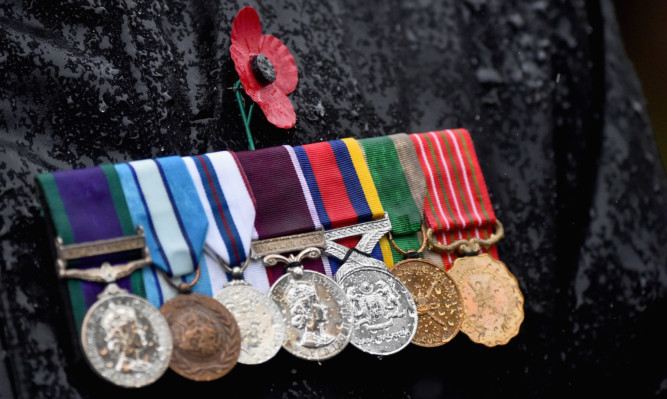Ceremonies and parades have been held throughout Scotland to remember servicemen and women killed in conflict.
A hush fell on Edinburgh’s Royal Mile where large crowds gathered for the annual wreath laying and service at St Giles’ Cathedral.
First Minister Nicola Sturgeon was joined by Scotland Office Minister Andrew Dunlop and representatives from a range of charities and organisations as she laid a wreath on behalf of the people of Scotland.
Remembrance Sunday events have also been held in cities, town and villages across the country.
Poppyscotland has lit up landmarks across Scotland in red to mark the day, including Eilean Donan Castle, the Falkirk Wheel and Glasgow’s SSE Hydro arena.See Monday’s Courier for full coverage of Remembrance Sunday events in your areaThe wreath laying in the capital took place at the Stone of Remembrance outside the City Chambers.
Speaking after the service, Ms Sturgeon said: “It’s hugely important that we take the time to come together and reflect on the sacrifice made by those who have fought for the country and have given their lives for the country in order that we can enjoy today the freedoms that we take for granted.
“This is the first Remembrance Sunday that I’ve laid the wreath as First Minister on behalf of the people of Scotland. That’s a huge privilege for me and one that I take extremely seriously.
“Right across Scotland and the UK today people at big services, but in smaller gatherings as well, in every community across the country will have taken the opportunity to remember, to reflect and to recall the gratitude that we owe so many.
“As each year passes there are fewer people now from the Second World War who are here to give direct testimony, so it’s important that we do take the opportunity to remind this generation and generations to come why this act of remembrance will be so important for many, many years to come.”
https://youtube.com/watch?v=aYaU8uNB8xs%3Frel%3D0
Kevin Gray, chief executive of Legion Scotland, said: “Remembrance is something that we do year in, year out, day in, day out, for some people on an hourly basis.
“Everybody remembers differently, there are some people who do it from inherited memories, memories of family members who were killed in war who are no longer with us and so their memories have been handed down through their children.
“Other people have direct memories of loved ones who paid the ultimate sacrifice in the defence of their nation.
“Today brings everybody together as one to join communities together in remembrance.
“War devastates lives, whether that’s from the loss of loved ones or for people who come back with life changing injuries.
“If we remember, we educate our young people of today so that in future when they are in a position of authority, when they may be able to make decisions to take us to war or prevent us going to war, if they remember days like today, they may make a different decision.”
